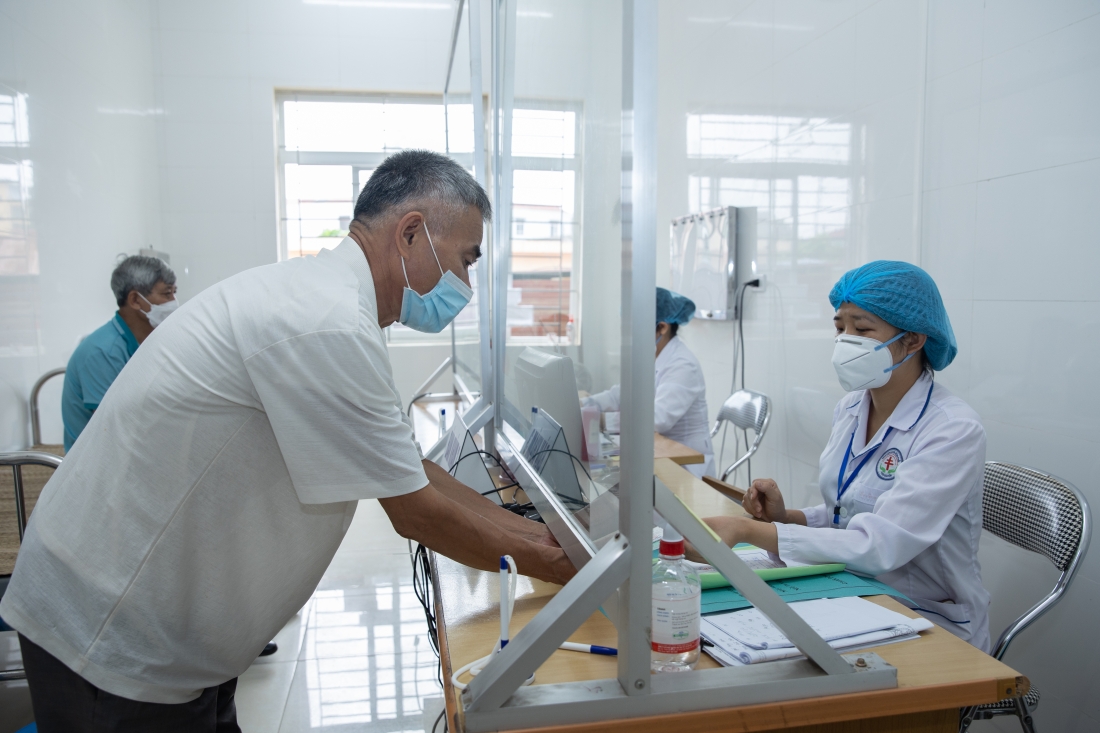LHSS Supports Vietnam to Cover TB Drugs in National Health Insurance, Paving the Way for Sustainable TB Treatment
Date

A TB patient uses a social health insurance card to get SHI medical services. Photo credit: LHSS Vietnam
Tuberculosis (TB) is a preventable and treatable disease, yet it remains one of the most common communicable illnesses in Vietnam. In 2021, an estimated 172,000 people in Vietnam had active TB and more than 13,000 of those cases resulted in death (WHO report 2021). TB often occurs alongside other infections and typically requires continuous treatment for at least six months. Interruptions in treatment can lead to multi-drug resistant (MDR) TB, which is over 12 times more expensive to treat than non-MDR TB (MOH, 2018).
Historically, Vietnam has relied on donors and government budget to fund its national TB program. In the context of decreasing donor support and pressure on government health budgets, reforming TB financing is critical to sustainability and to ensuring continuous and high-quality access to TB services. Since 2016, the Government of Vietnam has been committed to transitioning TB service delivery to the country’s Social Health Insurance (SHI) scheme, which currently covers 90% of the country’s population and provides subsidies for low-income and other vulnerable population groups.
“TB requires long-term treatment. TB patients are often poor, and many are also burdened with other diseases. Therefore, providing TB examination and treatment including TB drugs, through SHI will help reduce treatment costs…and prevent potentially catastrophic financial losses caused by the disease,” said Nguyen Binh Hoa, Deputy Director of the National TB Control Program. “Providing TB drugs through SHI [will] ensure sustainable treatment and continuous access to drugs for TB patients.”
"SHI TB drugs will bring benefits for SHI card holders and insured TB patients." -TB Patient, Quang Ninh Province
Since 2020, the USAID Local Health System Sustainability (LHSS) Project has worked with the Vietnam government to transition funding of TB treatment to the SHI fund. The Ministry of Health (MOH) successfully procured the first-line TB drugs via the SHI scheme in May 2022, and eligible facilities began providing SHI TB drugs to patients in July 2022. This marks a critical milestone for Vietnam in its shift to sustainable financing for TB, ensuring uninterrupted access to life-saving treatment.
Prior to this transition, Vietnam faced challenges in continuous commodity financing, putting patients at risk of interrupted treatment. “[Due to imminent stock-outs], we had twice called for emergency aid from international donors,” said Dr. Nguyen Viet Nhung, Director of the National Lung Hospital and the National Tuberculosis Control Program (NTP). “[We are] committed to [not let] that happen again.”
LHSS has worked closely with the National TB Control Program (NTP) throughout this process, guided by a co-developed TB Transition Roadmap. Specifically, LHSS worked with NTP to advocate for the development of TB procurement plans, provide technical assistance to centrally procured drugs—drawing on lessons from ARV procurement in Vietnam, and develop and disseminate guidance to provincial governments and health facilities as they prepare to provide SHI TB drugs for the first time.
As Vietnam continues to implement its transition, the LHSS project will support NTP to update relevant policies, provide technical assistance to provincial governments and health facilities as they prepare to meet SHI eligibility criteria, navigate complex procurement processes, and manage TB supply chains. The procurement and distribution of SHI TB drugs is a significant achievement that moves the nation towards a future of sustainable healthcare and towards the goal of ending TB by 2030.
